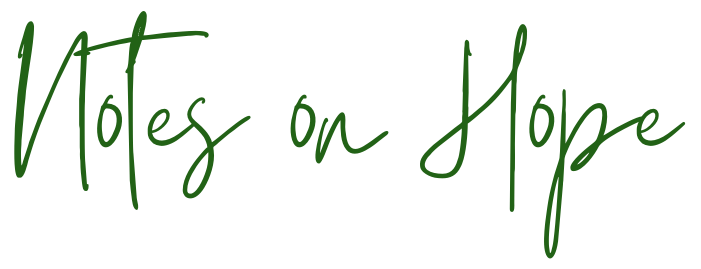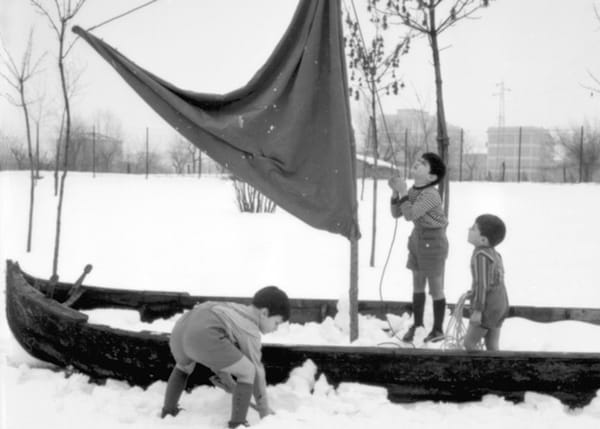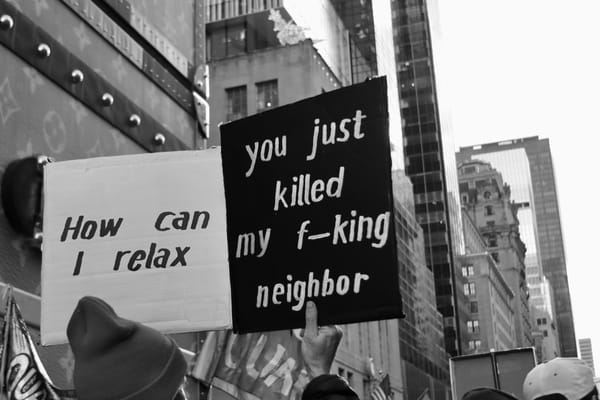Welcome to Our New Home!
And why the small choices we make matter

“The World
didn’t change much
at first. At
first it didn’t change
much, at first I
didn’t—I don’t—
change much.”
~Jorie Graham
Welcome to the new Notes on Hope! Last week, I shared a little bit about my decision to move Notes on Hope off of Substack. This week’s note is the first note posted exclusively on the new website, hosted by Ghost, and delivered to subscribers through the Ghost system. If you are already a subscriber, you should be receiving this note in your inbox as usual. (If you did experience any hiccups in delivery, please let me know so I can try to resolve the issue for you.) And, if you’ve found your way to the website or have been forwarded this note and are not yet a subscriber, hi!
I promised last week that I would provide a more thorough explanation this week for why I made the decision to move to a new platform. I think it’s important—not just in a behind-the-scenes, nuts-and-bolts way, and not in a world changing way, but in the way that so many of our small choices carry both personal and collective weight. As with so many such choices, staying on Substack would have been easier. It’s almost always easier to continue along the path you’re already on than to shift course, and it is also usually easy to convince ourselves that the small choices we make in our little, individual lives won’t make a significant impact. This can be dispiriting when we’re confronted with the big problems of the world that we long to have the power to solve. But it is also a mindset that sometimes allows us to dissolve cognitive dissonance and let ourselves off the hook for the role we do play and the impact we can have.
I’ve written a lot in these notes about the ways in which our seemingly small choices and actions can add up to bigger change in positive ways. Though we are sometimes presented with exceptions that foster cynicism, like greenwashing campaigns or the failure of recycling programs, it’s a mistake for the lesson of these examples to be an assumption that none of our choices matter. Whether we are looking at political examples, like the impact of protest, or other ecological examples, like reducing meat consumption or shifting to renewable power, individual actions can have a meaningful impact. That impact almost always hinges on large-scale participation, but there’s no way to reach large-scale participation if we all find reasons to exempt ourselves. Our small individual actions also matter to our own wellbeing, because constantly reconciling cognitive dissonance takes a psychic toll. And, of course, when our actions impact someone else, they matter a great deal, even if they don’t save the world.
But it’s not only the positive actions we take that matter. The small choices we make each day that contribute to harm also accumulate, and many of the most routine aspects of our lives often present themselves within this frame. Most of us probably don’t have as many opportunities to toss a starfish back into the sea as we do to throw out a straw that will one day reach a starfish. It’s often more satisfying to take the positive actions when they present themselves clearly than to avoid the negative ones that are so ubiquitous, but they all matter.
Over the course of the past year, remaining on Substack began to feel increasingly like one of those small choices that was quietly contributing to harm. Realistically, it’s not possible, within the current constructs of contemporary life, to avoid every single one of these choices in our daily lives. But this was a decision I absolutely had control over. There were other options, and not taking them began to feel more and more out of alignment with the very goals, values, and reasons for hope that I try to share in these notes every week.

So, how did we get here? Let’s backtrack.
Substack has been a game changer for independent writers. It offered a way for writers to focus on writing and building readership, without having to drain time and resources on tasks like constructing a website or soliciting advertisers, which are often necessary to making more traditional online publishing formats like blogs successful and sustainable. This was groundbreaking and good! Substack has also helped to reestablish a greater threshold for long-form reading. There's a lot of warranted concern about our decreasing attention span and capacity for focus. And yet some of the most widely read writers on Substack regularly publish thoughtful, lengthy pieces that seem to defy the trend toward an ever decreasing appetite for nuance. This is also good!
However, as Subtack has grown, some predictable cracks have emerged. For example, Substack has become a welcome home for some overtly white-supremacist and and self-described Nazi newsletters. This was inevitable, as any widely used platform will, over time, attract some level of extremism. The founders of Substack have adamantly framed this issue within the context of free speech and the challenges that content moderation poses to first amendment rights. However, the validity of this position rests on Substack functioning as a neutral space for open discourse. The Substack founders, when standing on the framework of free speech, position themselves—much as other social media executives have done— as the architects of a new “town square,” whose role is simply to create the forum for speech, not to govern that speech.
This could be an admirable and necessary stance—if it honestly reflected the Substack founders' role. Free speech is one of our most bedrock democratic rights and also, perhaps, the most challenging of our rights to commit to and defend, because it requires that we support the rights of those with whom we may vehemently disagree. As painful as it can be to defend speech that violates our most basic moral values, and at times even our sense of our own humanity, protecting it is the only way we avoid relinquishing our own rights.
The problem with Substack’s argument, though, is that the founders of the platform have not, in fact, created an open town square to flourish (or fracture) under their neutral eye. Rather, the founders of Substack have created a business model that not only profits off of the writers who build large audiences on the platform, but also one in which they play a very active role in soliciting, curating, and amplifying individual voices. In this context, the cries of free speech easily become an illusionary curtain of morality, the purpose of which is not actually to uphold speech but to obfuscate mechanisms that are really designed to amass profit and influence. We’ve seen an accelerated version of this story play out in the transformation of Twitter into X over the past three years. Though it’s been less visible in the public sphere, Facebook also provides a stark example; its business decisions were found by multiple researchers on international law, the United Nations, and Amnesty International to have contributed significantly to genocide in Myanmar in 2017.
It is essential to grapple with the challenges of free speech and to defend open forums for discourse, even when it is painful to do so. It is also important to recognize when these arguments are being used to mask policies that have little to do with speech and everything to do with profit and the power that massive profit often grants. As a Harvard paper on the Myanmar genocide notes, “this outcome is the ultimate consequence of an atmosphere of absolute corporate impunity.”
With regard to Substack’s evolution on these issues, and the reasons that ultimately led me to decide that the company was straying too far in the direction of the examples noted above, the political journalist Marisa Kabas and the technology journalist Casey Newton have both shared extremely helpful summaries from different vantage points. Both are former Substack writers, who have chosen to leave. As stated in a letter compiled by a group of former Substack writers, “There’s a difference between a hands-off approach and putting your thumb on the scale.” Substack isn’t simply taking a hands-off approach to speech; it is actively curating and promoting publications and implementing its own content moderation rules selectively. Additionally, Substack takes a 10% fee on all paid subscriptions, which means that they are profiting from these writers' supporters, and other writers on Substack who have paid subscribers are indirectly asking those subscribers to help subsidize Substack's editorial and promotional choices. The distance between accepting these compromises and accepting more deeply harmful ethical slippage when it comes to profit is likely shorter than most of us want to think. As Newton states, “We’ve seen this movie before—and we won’t stick around to watch it play out.”
An element of free speech is also rooted, not only in our words, but in our freedom to choose where we use our voices. We've been presented with a narrative by social media companies that these constructed spaces are the new town square. But the power of a true town square is that it’s a public space, defined by the people who gather there, not by those who profit from our gathering. For true discourse, art, and democratic engagement to thrive, I think we need to begin to find ways to disentangle our voices from those who would have us believe that our expression only has value within the confines of the structures that have been created for the accumulation of wealth and influence, not for the true benefit of dialogue. There is a reason that the original town squares formed in piazzas and parks, not in the halls of palaces. Truly democratic spaces are public spaces. Social media companies are not fundamentally public spaces—they are corporations. The distinction is one we lose sight of at our peril, but when we keep this distinction front and center, it’s easier to remember that we have the power to move the town square.
My voice here is very small. But, as I’ve written about often, many small voices have cumulative power, so we can’t be afraid to exercise agency over our own speech. And that agency is found, not only in our words, but in when and where we choose to use them.
Additionally, the little choices we make accumulate in our own minds. It’s not only that our decisions and actions are compounded by others. Each decision we make paves the way to the next decision we make as individuals. While it’s not possible to hold ourselves to perfect ethical standards within complex, deeply imperfect, and often harmful systems, it is important to be aware of how giving ourselves permission to make one easy choice opens the door to the next easy choice.
For me, starting this writing project on Substack was an easy choice involving compromises that seemed relatively small at the time. But those compromises are growing as their business model grows. Each week of publishing there began to feel like one more small harmful choice granting permission to the next, and that feeling meant that it was time to take my voice elsewhere.
Given that a lot of what I write about here touches on parenting and how we raise brave children, who will shape the future in positive ways, modeling ethical choices, even when they seem very small, is also extremely important to me. Children don't just watch the big moments in our lives. They are keenly attuned to all of the small moments in the lives they share with us, and these are the choices that shape their own moral compass and sense of responsibility toward others and toward the future.

Lastly, a few words on why I chose Ghost. I’ve worked for enough non-profits to know that they are not perfect. Power can become corrosive in any context, even when the structure is intended to lean toward the public good. But I do think Ghost’s structure lends itself better to the public good than other writing platforms do. First, as a non-profit, Ghost is constrained from putting its own profit accumulation front and center in its growth. Second, where Substack’s revenue is derived from a percentage of paid subscriptions, Ghost simply charges writers a fee to use the site. While there are levels geared toward different audience sizes and site features, this structure doesn’t position Ghost to prioritize subscriber numbers in the heightened way Substack does. Third, Ghost has steered away from developing into a social media platform, and the shift toward social media features is where many of Substack’s most problematic decisions have been made.
I don’t expect that Ghost will be free of writers I disagree with or whose values are vastly opposed to my own. In fact, I’m sure those writers are already here. That is the bargain of free speech and open discourse. I do, however, feel confident that, under their current model, Ghost is less likely to become an endorsement and amplification machine for those voices, in the interest of profit. And I know that subscriptions to Notes on Hope are not directly funding the growth of those voices in the way that they did on Substack. Should Ghost’s structure and approach change, I’ll find somewhere else to write. That’s the power of our speech—it is ours wherever we choose to use it.
So, that’s the scoop. I think decisions like this are central to how we sustain hope and raise children for a more hopeful future—even when these decisions are small in magnitude and reach.
To those of you who have been reading from the beginning, thank you. You’ve given me the courage and motivation to keep writing each week. To those who have shared Notes on Hope and helped others find their way here, thank you. This is the primary way new readers have joined, and I’m grateful for your support. And to those who are new, welcome!
In many ways the world feels darker and scarier than it did when I started writing about hope a year ago. But, as I wrote last week, I think it is more critical than ever to hold onto hope tenaciously and to choose to use our hope as fuel to make conscious choices and work toward a better future. Here’s to another year of creating light in darkness. Thank you for being here with me.
With hope and gratitude,
Alicia
A few things I found helpful and hopeful this week…
- Erica Chenoweth on the elements of effective civil resistance
- A deep dive on how mutual aid works, and why it's essential, under fascism
- The story of a Harvard Educational Leadership student, whose grandmother sold her land and cattle to help him, and whose education is now on hold. This is a powerful example of the sacrifice we make when we don't welcome immigrants into our educational institutions. Students like Magaga Enos will change the world if we just give them a path.
- Robert Reich on the lessons in A Bug's Life!
- And, finally, some resources to support LA right now. Please share!
- Immigrant Defenders Law Center
- LA Jail Support & Bail Fund
- And a number you can call if you're in the National Guard or Active Duty military and are being ordered to violate the constitutional rights of US citizens: GI Rights Hotline, 877-447-4487
If you think someone else in your life might need some hope, please share! It’s always easier to hold onto hope when we’re not doing it alone.
And if you appreciated this post and are not already a subscriber, please consider subscribing to Notes on Hope.





